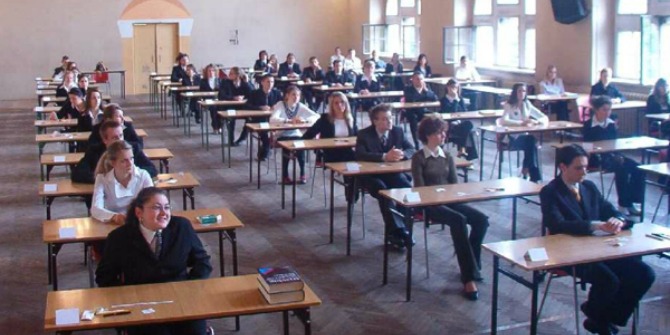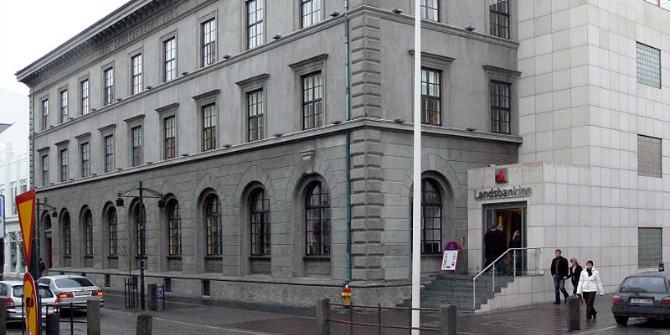 High-school pupils in Szczecin, Poland, waiting to write a matura exam, 2005, by Marcin Otorowski and Oskar Błaszkowski, CC BY-SA 3.0, Wikimedia Commons
High-school pupils in Szczecin, Poland, waiting to write a matura exam, 2005, by Marcin Otorowski and Oskar Błaszkowski, CC BY-SA 3.0, Wikimedia Commons
| The Surviving Work in the UK series is produced by Surviving Work. |
What is clear is that another cohort of 16 year-olds has passed through the eye of a very narrow scholastic needle, a rite of passage that some argue does not prepare them for the real world. They may be forgiven for thinking that those exams were the ultimate raison d’être, so complete is the focus given them by schools. Indeed, research by the University of Birmingham’s Jubilee Centre for Character and Virtues has published two reports recently that reveal that over 80 per cent of teachers feel the narrow focus on exams and related workload are hindering the development of things such as moral character.
The National Union of Teachers’ provocatively entitled report Exam Factories? The impact of accountability on children and young people raises a number of concerns about excessive focus on examinations – for students and teachers. Not least of these is the fact that the pressures to improve exam attainment cause our educators to “focus their teaching very closely to the test” at the cost of offering a wider educative experience (including the presentation of knowledge and the development of creativity and analytic thinking). Nor can head teachers or teachers be blamed for this, when their careers and pay packets become ever more closely linked to the headline metric of examination performance. The effect of this on students themselves, as we shall see, is even more deleterious.
For myself, as a psychologist, I have encountered so many students anxious about exams (with inevitable worry sequence of “not getting a job” and “ending up homeless”) that my response to a recent request for an “emergency” GCSE anxiety session was slightly blasé. For a number of years now, schools have seemed to respond to the inevitable conclusion of so many years of accreted anxiety about exam performance – students all but crushed by the weight of their importance (for the school) – by frantically shunting in, at the last minute, a few talks about how to breathe and squeeze it all away.
Thinking thus, I was dry-gulched by the articulate, angry group of ten or so Year 11 students in front of me this time. No, I was informed, anxiety was not the issue. Rather, I had been sent to talk to them because, in their words, the school had neglected really teaching them for so long and were now freaking out about how their poor performance would affect its place in the school league tables. A case of displacement indeed. So angry were some of them that they had resolved not to bother revising: by failing their exams they would certainly teach the school a lesson. Experiential learning is often quite painful after all… My therapeutic skills paled in the face of their wrath and I spent the rest of the session begging them to revise for their own sakes, their own futures.
I left severely rattled but upon reflection I should not have been so surprised. The conclusion they drew has not come out of nowhere. And this group of 15 and 16 year olds were accurate in their appraisal and judgement. They knew the teachers who cared and the ones that didn’t and it was the former – a dismal minority – for whom they were willing to expend effort. Mr Chips really is dead.
It is easy to blame the schools, the teachers, the head teachers for this but that, I believe, is missing the point. Philip Zimbardo, in his study of the Abu Ghraib jailers’ atrocities, commented that this was not an issue of bad apples, or apple barrels but the apple barrel makers. A system gets out what it puts in. This is certainly the case for the tormented plaything that is compulsory education in the UK. And from my own experiences in schools, something supported by evidence, schools are more and more removed from being the type of place – space – where thinking, let alone learning, can occur.
I have observed teachers haggling over difficult students to see if they can be taught in another class because their behaviour or low ability might affect a teacher’s performance-related pay (this in a comprehensive school!). Even head teachers seem to be shifting towards a survivalist attitude reminiscent of premier league football coaches: one bad batch of GCSEs and they can be out, careers ruined. And it is already recognised that student mental health is at worryingly high levels.
What these students railed against, and what most teachers know, even if they are too hard-pressed to act on it, is that teaching – learning – is a relational activity. I open my mind up when I feel safe. Stressed out irascible adults trip my vagal nerve and ping! cortical inhibition, triggered by unconscious threat signalling and detection systems, shuts my brain down. And the acquisition of knowledge and skills does not, for all that policy makers might wish it, work like Lego, with little coloured chunks of maths/geography/science clicking neatly together, never to be lost (how interesting that the more quantifiable subjects, STEM subjects are being elevated. You can’t measure a poem or a dance).
Schools, as they become ever more tyrannised by the expectation of better and better results, are reducing learning to a quasi-automated process, forcibly conceiving students as empty vessels that must – must – be filled. A western construct of knowledge as product: offer, then shove and then exclude.
In psychoanalytic parlance we are, I think, witnessing a serious lack of containment in and around schools. There is no safe space to learn, to muse, to fail… to engage in the sort of reverie that is so necessary to proper emotional and intellectual growth. If it is lacking for Heads, then it is lacking for teachers and so for students too, something my un-anxious group felt as a visceral-marrow-bone-truth. If you treat us as mechanisms we will resist. This is human nature, surely?
Certainly, when I talk to head teachers about Isabel Menzies‘ study of social defences in a teaching hospital, about how easily humans are reduced to functions or pathologies (“the pneumonia in bed 15”, for example), there is an uneasy silence as they recognise the parallels. As schools contend with the ever greater risks of poor exam results — a valid but not all encompassing indicator of teaching quality — it becomes all the more easy to reduce students to part objects in the form of a spreadsheet. And when this occurs, it signals a capitulation on the part of educators to a grim, mechanical, rationalist model of human functioning.
This seems predicated not on what helps humans to grow and flourish (certainly there is little room for the emotional truth that Bion suggests is necessary for growth of mind) but rather is in thrall to a narrative that says: a) we must be competitive with China and; b) this is how you do it. This narrative conveniently forgets that this is likely to increase rates of student suicide and that straight-line education does not prepare young minds to think creatively about the problems of today and more critically – they will be the grown-ups soon – tomorrow. Heck, they might treat us like we’ve treated them.
Another episode from a school highlights just how easy and damaging it is for schools to fall into the part-object trap. J was a 15-year-old girl with significant mental health concerns, depressed, suicidal and very confused about her gender identity. That she was also MENSA bright and hugely concerned about the point of life, went by the wayside. She was also the author of numerous appreciative, anonymous notes posted around the town that made the national news, so touched were the recipients. These obvious difficulties and qualities counted for nothing to the deputy head tasked with improving attendance. Hers was below 87 per cent and he wanted to exclude her. So, where is the humanity?
Real learning is dirty, laborious, exciting, dangerous… even, at times criminal (Prometheus did steal the fire, after all). And while it can’t all be “Captain, my Captain” it equally does not seem unreasonable, in a liberal democracy, in the 21st century festooned with psychological and scientific insights, to expect some empathy, some capacity to see the other as an entire entity, to creep in.
To relate to each other as complete “objects’, not as functions to service our own preoccupations and anxieties. For that to happen, the Apple Barrel Builders – the policy makers, the politicians – might just have to let go a bit. In my darker moments I wonder if the political focus on schools is less about educating the next generation and more because annual GCSEs are a reliable metric through which a government can demonstrate its effectiveness: but at what cost?
If the actual experience of learning becomes a turn-off it benefits no one. Because when I heard – really heard – what my group were saying, the implication gave me vertigo. If the idea that schools teach just to scramble a few points up the league table gets out and becomes an adolescent meme, “schools don’t care, they just need us to make them look good”, well, that’s a very easy way to turn a generation off learning for good. Now that is something we cannot afford.
♣♣♣
Notes:
- For the full list of articles in the Surviving Work in the UK series, click here; for a list of contributors to the series, click here.
- The post gives the views of its author, not the position of LSE Business Review or the London School of Economics.
- Before commenting, please read our Comment Policy
 Xavier Eloquin is an educational psychologist and organisational consultant working in the public and private sector. He is an associate fellow of the British Psychological Society. He is a visiting lecturer on group and organisational dynamics for the Tavistock Clinic Educational Psychology Doctorate course.
Xavier Eloquin is an educational psychologist and organisational consultant working in the public and private sector. He is an associate fellow of the British Psychological Society. He is a visiting lecturer on group and organisational dynamics for the Tavistock Clinic Educational Psychology Doctorate course.






1 Comments